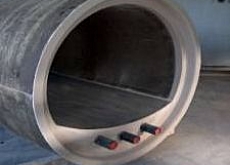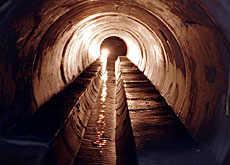Sewers tapped for energy potential

A Swiss system that transforms wastewater into energy is attracting interest from around the world, thanks to rising oil prices.
On cost terms it can now compete with oil and gas as a method of heating buildings.
The heating and cooling system devised and patented by Zurich-based Rabtherm is in demand across the world, from Vienna to Vancouver. But it has taken ten years to reach this point.
The company is owned by Urs Studer, who has spent the past decade improving the technology.
“Until now I have had to finance each development stage myself, but now suddenly the banks are interested,” said Studer.
The idea is simple: a heat-exchanging device is inserted into the sewer system, which must be no more than 400 metres from the buildings it serves.
Wastewater has an average temperature of 25 degrees Celsius, and a special pump is used to bring it up to the required temperature for heating the home. In summer the system can be used to power air conditioning units.
Energy recycling
Rabtherm says the process is environmentally friendly because it re-uses water, produces less carbon dioxide than conventional heating systems and costs less to run. It doesn’t smell, makes no noise and can’t be seen because it’s buried underground.
The wastewater from 300 houses is enough to provide heat for 100 homes. Currently the system is used in Switzerland for developments of 50 houses or more, but Studer is looking into making it viable for smaller blocks of six or more houses.
The potential of wastewater as a source of energy has long been recognised by the Federal Energy Office. Ernst Müller, who heads the wastewater recycling division, said the increase in oil prices could make the technology much more attractive to those building new homes.
“Wastewater provides one of the cheapest forms of heat we have,” explained Müller.
Investment
In Germany there are plans to invest around €10 billion (SFr15.5 billion) in creating 20,000 wastewater heating plants.
Experts reckon that between five to ten per cent of buildings in Switzerland could be heated in winter and kept cool in summer using wastewater. This would require 2,000 installations.
The city of Winterthur is setting the standard in Switzerland for harnessing the energy from wastewater. Those building new homes are obliged to check whether heat-exchange devices can be installed.
A study has shown that the city has 41 spots suitable for installing wastewater heating systems.
If all these installations were built, fossil fuel consumption in Winterthur would fall by 4,000 tonnes annually, while CO2 emissions would be cut by 7,000 tonnes. Such a scheme would cost around SFr27 million.
swissinfo, based on an article previously published by NZZ am Sonntag
The wastewater in sewers is a continuous and renewable source of energy with a relatively high temperature.
The internationally patented Rabtherm system uses a heat pump run by an electric or gas motor to warm the water to a maximum 67 degrees Celsius and feed it into the heating system.
In summer the system can also be used to drive air conditioning units. The wastewater from 300 homes can provide energy for 100 houses.

In compliance with the JTI standards
More: SWI swissinfo.ch certified by the Journalism Trust Initiative


You can find an overview of ongoing debates with our journalists here. Please join us!
If you want to start a conversation about a topic raised in this article or want to report factual errors, email us at english@swissinfo.ch.